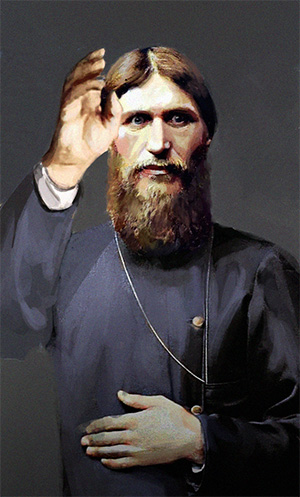Difference between revisions of "Template:POTD protected"
Occultwiki (talk | contribs) |
Occultwiki (talk | contribs) |
||
| (6 intermediate revisions by the same user not shown) | |||
| Line 1: | Line 1: | ||
{| role="presentation" style="margin:0 3px 3px; width:100%; text-align:left; background-color:transparent; border-collapse: collapse; " | {| role="presentation" style="margin:0 3px 3px; width:100%; text-align:left; background-color:transparent; border-collapse: collapse; " | ||
|style="padding:0 0.9em 0 0;" | [[File: | |style="padding:0 0.9em 0 0;" | [[File:Rasputin.jpg|300px|thumb|]] | ||
|style="padding:0 6px 0 0"| | |style="padding:0 6px 0 0"| | ||
'''[[ | '''[[Grigori Rasputin|Grigori Yefimovich Rasputin]]''' was a Russian mystic and self-proclaimed holy man who befriended the family of [[Nicholas II]], the last Emperor of Russia, and gained considerable influence in late Imperial Russia. | ||
Alternative religious movements such as spiritualism and theosophy had become popular among the city's aristocracy before Rasputin's arrival in St. Petersburg, and many of the aristocracy were intensely curious about the [[occult]] and the supernatural. Rasputin traveled to Saint Petersburg in 1903 or the winter of 1904–1905, where he captivated some church and social leaders. He became a society figure and met [[Nicholas II|Tsar Nicholas II]] and Tsarina Alexandra in November 1905. | |||
Historians often suggest that Rasputin's scandalous and sinister reputation helped discredit the tsarist government and thus helped precipitate the overthrow of the Romanov dynasty a few weeks after he was assassinated. Accounts of his life and influence were often based on hearsay and rumor. | |||
<p><small> | <p><small>Photo Credit: [[Bloodstone Studios]]</small></p> | ||
[[:Category:Images|'''(More Images)''']] | [[:Category:Images|'''(More Images)''']] | ||
<div class="potd-recent" style="text-align:right;"> | <div class="potd-recent" style="text-align:right;"> | ||
Latest revision as of 16:10, 31 May 2024
|
Grigori Yefimovich Rasputin was a Russian mystic and self-proclaimed holy man who befriended the family of Nicholas II, the last Emperor of Russia, and gained considerable influence in late Imperial Russia. Alternative religious movements such as spiritualism and theosophy had become popular among the city's aristocracy before Rasputin's arrival in St. Petersburg, and many of the aristocracy were intensely curious about the occult and the supernatural. Rasputin traveled to Saint Petersburg in 1903 or the winter of 1904–1905, where he captivated some church and social leaders. He became a society figure and met Tsar Nicholas II and Tsarina Alexandra in November 1905. Historians often suggest that Rasputin's scandalous and sinister reputation helped discredit the tsarist government and thus helped precipitate the overthrow of the Romanov dynasty a few weeks after he was assassinated. Accounts of his life and influence were often based on hearsay and rumor. Photo Credit: Bloodstone Studios |
